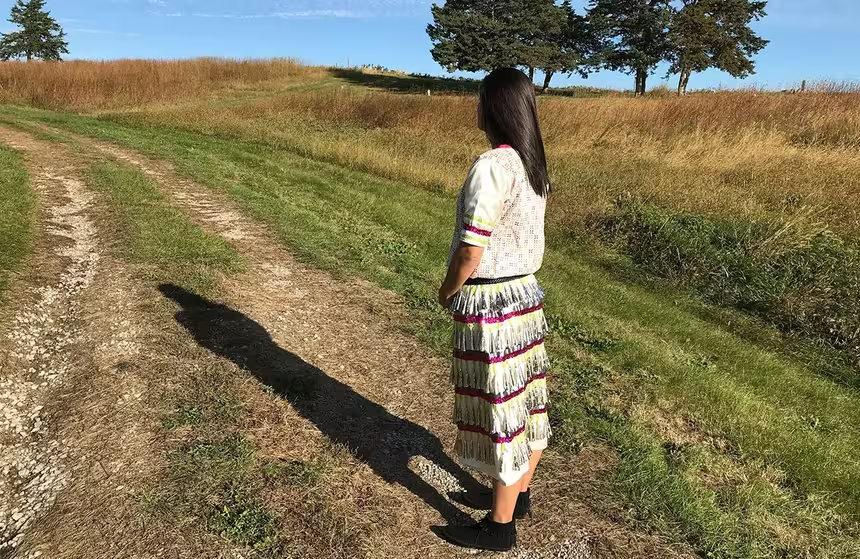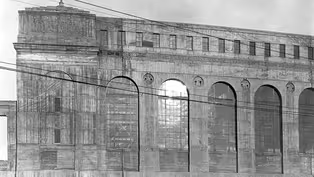
Cornhusking, Harvesting Heritage
Clip: Season 15 Episode 3 | 6m 35sVideo has Closed Captions
Watch cornhusking the old-school way.
Before farming became mechanized, picking corn by hand and pitching ears into a horse-drawn wagon was how harvesting was done. In the late 19th century, local contests were held to determine the best corn picker in the community. By the 1930s, hand corn husking became the fastest-growing sport in America, drawing over 100,000 spectators at national contests. Nebraska is one of nine states still ho
Problems playing video? | Closed Captioning Feedback
Problems playing video? | Closed Captioning Feedback
Nebraska Stories is a local public television program presented by Nebraska Public Media

Cornhusking, Harvesting Heritage
Clip: Season 15 Episode 3 | 6m 35sVideo has Closed Captions
Before farming became mechanized, picking corn by hand and pitching ears into a horse-drawn wagon was how harvesting was done. In the late 19th century, local contests were held to determine the best corn picker in the community. By the 1930s, hand corn husking became the fastest-growing sport in America, drawing over 100,000 spectators at national contests. Nebraska is one of nine states still ho
Problems playing video? | Closed Captioning Feedback
How to Watch Nebraska Stories
Nebraska Stories is available to stream on pbs.org and the free PBS App, available on iPhone, Apple TV, Android TV, Android smartphones, Amazon Fire TV, Amazon Fire Tablet, Roku, Samsung Smart TV, and Vizio.

Do you have a Nebraska Story?
Do you have a story that you think should be told on Nebraska Stories? Send an email with your story idea, your name, your city and an email address and/or phone number to nebraskastories@nebraskapublicmedia.org. Or, click the link below and submit your information on nebraskastories.org.Providing Support for PBS.org
Learn Moreabout PBS online sponsorship(upbeat music) (upbeat music) -(cornstalks rustling) -(bangboard thumps) - [Narrator] It's a beautiful September Saturday in Nebraska, and these huskers are preparing to take to the field, but they won't be slinging pig skin at Memorial Stadium.
These fierce competitors are going old school in a battle of the bangboards at the annual Nebraska State Hand Cornhusking Contest.
- [Duane] Well, somebody said there's gonna be a corn pickin' contest today, and I thought I'd join the crowd.
- [Narrator] Today's crowd is a bit smaller than during the heyday of corn picking contests.
The 1936 National Championship in Ohio drew about 160,000 people.
At the time, it was considered the fastest-growing sport in the US.
Sherman Henriksen of rural Lincoln took home Nebraska's first national title, husking 38 bushels of corn in 1933.
(corn stalks rustling) -[Harrison] I'm a fairly competitive person, and something like this, it's not super difficult, but it's pretty fun.
Like, once you really get into it, it's a pretty fun sport, I guess.
(guitar music) (wagon clatters) - [Narrator] Before farming became mechanized, shucking corn by hand and pitching ears into horse-drawn wagons was how harvesting was done.
(guitar music) (bangboard thumps) - Whoa, whoa.
- [Duane] I grew up pickin' a load of corn with my dad every morning before school.
Oh, yes, I know what corn pickin' is.
(guitar music) (corn stalks rustling) You wanna keep your eyes on the ears of corn ahead of ya.
You never look at the wagon because your ears will tell you if the ear hits the bangboard.
(bangboard thumps) And the way you do it, you pick it.
You get it like this, (guitar music) and you don't throw it like this.
You flip it.
-(corn rustling) -(bangboard thumping) - [Paul] The big thing was 100 bushel a day.
"Boy, I'd like to get 100 bushel a day."
And I did it once, only once.
(guitar music) I was young.
But I think it might've been a little bit dark almost when I went out there and it was probably dark when I quit.
(guitar music) - [Narrator] Nebraska is one of nine states still holding cornhusking contests.
And it is a timed event.
Depending on the class a picker is in, they can husk anywhere from 10 to 30 minutes.
-- [Judge] Cut.
-Three, two, one, go!
-[Narrator] The person who picks the most weight of husk-free corn wins.
And there's quite a process involved in deciding the winner.
-(leaves rustling) -Nice.
-(bangboard thumps) -Whoo!
(corn rumbling) - [Patti] They empty the wagons into the big metal tubs.
They weigh the metal tubs.
(machinery running) And any gleanings that are in the bags they forgot to pick or they miss the wagon, those count against them also.
And so you take the gross weight and you minus the ounces of the husk and the minus the pounds of the ears, and that's what they have for the day.
(fiddles play "Star Spangled Banner") (violins play "Star Spangled Banner") - [Narrator] Gothenburg and Holdredge have hosted the contest in the past, but it's found a permanent home at the Stuhr Museum in Grand Island.
-[Announcer] The event is important, certainly for the competitors, and we are very grateful for the competitors that are here.
All of you should be very proud because right here where you stand in this state is how we taught the world how to feed itself.
(upbeat country music) - [Narrator] Taking on the State Hand Cornhusking Contest presented some unexpected challenges to the Stuhr Museum.
-[Chris] This event was in jeopardy of just falling off the face of the state, so to speak, and not being held.
We didn't have some of the resources that we needed.
So we partnered with several folks and they came in strong and we were able to do it.
-[Bryan] Some of our growers helped us with the ground prep to get it ready for planting.
The horse teams came in and broke all the sod and the prairie grass.
(chains jingling) I'd always loved farming and being around agriculture.
It's just a passion that I've always had.
And I felt like with the last name of Corn, I kind of had to do something in ag, so it was just a perfect fit.
(country music) -[Chris] We do living history at Stuhr Museum.
That's what we're known for.
And if this isn't living history, I don't know what is.
I mean, it's modern-day interpretation of something that's happened a hundred years ago.
(corn stalks rustling) From a historical perspective, I desperately wanted this to happen here.
(corn stalk rustling) - [Narrator] And happen, it did.
(upbeat country music) -[Brynn] I got first.
(clicking sounds) I think I got 18 ears, I think.
I think so.
(distant chatter) (corn rustling) -[Harrison] I picked 260 pounds of corn in 30 minutes.
And then I placed third out of three, but I was pretty close for second, so.
And they're both previous national champions.
So I felt like I did okay.
- [Duane] I was tardy once in 13 years and never absent, so.
(guitar music) I made sure I went to school so I didn't have to pick corn all day.
(companion laughs) -[Patti] Dwayne Frazier, he had a gross weight of 39 pounds.
He had 0.5 ounces of husks against him, and he had 3.2 pounds of ears against him.
- [Harrison] I think history is kind of a big part of our world.
(guitar music) Our generation is really straying away from the old techniques and manual labor.
And I think it's fun to look back and see how the older generations used to farm this land and make their money.
(guitar music) (guitar music)
Video has Closed Captions
Clip: S15 Ep3 | 8m 36s | The creation of a Nebraska icon, Nebraska's Memorial Stadium. (8m 36s)
Providing Support for PBS.org
Learn Moreabout PBS online sponsorshipSupport for PBS provided by:
Nebraska Stories is a local public television program presented by Nebraska Public Media
















